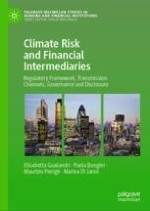Climate change is defining structural modifications that affect the economy and the financial system. Within Europe, supervisors and supervised entities are increasingly focusing on the consequences of environmental, social and governance (ESG) risks, as they impact the soundness and stability of the financial system or interfere with the transmission channels of monetary policy and price stability, as well as raising sustainability financing issues.
Focusing on climate-related risks within the broader theme of the ESG risks, this book, structured in six chapters, analyzes the evolving overall regulatory framework, the climate risk transmission channels, the peculiarities of climate risk transmission channels with reference to specific business models of financial intermediaries, and the governance and disclosure implications of climate risks. It will be of interest to academics, practitioners, and students in the fields of banking, financial services, sustainability, ESG, andclimate risk.
